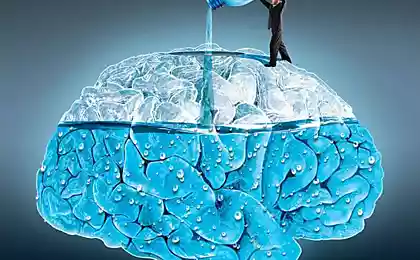424
11 working ways to get a little smarter every day
The intellect, like the body, requires good nutrition and regular exercise. Keep it in good shape — especially in your disposal several proven IQ-simulators. We know that memory can be trained to learn foreign languages or learning poetry, the body — yoga and physical loads. But all this requires the will and considerable disability.

The website offers not 11 the most obvious ways to get smarter without much effort from the scientists. They explain how sugar, water, and computer games influence our mental abilities.
1. Within 30 minutes after you Wake up drink two cups of water. Water is essential for our body to filter toxins and maintain the balance of fluids. When we sleep, we don't drink for 6-9 hours. Two large glasses of water will fill this deficit. Studies involving children1 also show that when students drink a lot of water, they are better able to cope with intellectual tasks.
2. During Breakfast, read book reviews. Newspapers and news feeds is not the best choice for a good morning. Be aware of the most useful books will help you a recap of the new publications in the field that interests you. To subscribe to reviews use apps like smartreading or knigikratko (books in Russian), Blinkist, and getAbstract.
3. On the way to work listen to podcasts or audiobooks. This is an easy and enjoyable way to continue to learn. A great source of valuable information will be the lectures of the portal TED (their mobile app allows you to download the audio files in advance, without extra spending on mobile Internet).
4. At work, drink green tea. Green tea (especially Japanese matcha powder) contains L-theanine. This aminosilane improves concentration and relieves stress without causing drowsiness.
5. Arrange a Siesta. A short NAP refreshes the thinking process and makes learning easier. On average, most people experience the need for sleep between noon and 16.00, and at around six in the evening. It's the perfect time to relax.
6. Limit consumption of sugar. It is best to abandon it altogether. But if you are not ready for such drastic action, try to at least not eat sweets during intensive work. The increase and subsequent sharp decrease in the level of sugar in your blood is bad for mental abilities. "Invigorate" the brain fatty acids, which are contained in eggs or in fish.
7. Check social networking and entertainment sites only one or two times a day. The brain adapts to the type of information you load it. If you bombard it with a rapid series, restimulation content, concentration inevitably reduced. If you are prone to procrastination, turn on the timer: so pointless scrolling tape of the social network will not take hours and days.
8. Instead of watching TV series and play games. Watching television — a passive activity and often completely useless. Try switching to video games. German исследователи2 found that even a simple game like Super Mario, has a significant influence on plasticity of brain structures.
9. Learn basic programming. Programming is akin to solving a puzzle. It is a powerful stimulator logical abilities. Thanks to new online resources (e.g. scratch.mit.edu or speaking Foxford) it can be mastered by even a schoolboy. And you can do it for sure...
10. Chat with scholars. Habits are contagious, and not only bad. The lifestyle and thinking of people around you definitely impose upon you imprint. Let the circle of your communication will get those who have a lot to learn.
11. Go for a walk. While walking improves blood circulation and oxygen supply to the brain, and the level of stress hormones is greatly reduced. Walk in the middle of the day is recharging to the late evening.
via www.psychologies.ru/self-knowledge/individuality/11-sposobov-stanovitsya-nemnogo-umnee-kajdyiy-den/

The website offers not 11 the most obvious ways to get smarter without much effort from the scientists. They explain how sugar, water, and computer games influence our mental abilities.
1. Within 30 minutes after you Wake up drink two cups of water. Water is essential for our body to filter toxins and maintain the balance of fluids. When we sleep, we don't drink for 6-9 hours. Two large glasses of water will fill this deficit. Studies involving children1 also show that when students drink a lot of water, they are better able to cope with intellectual tasks.
2. During Breakfast, read book reviews. Newspapers and news feeds is not the best choice for a good morning. Be aware of the most useful books will help you a recap of the new publications in the field that interests you. To subscribe to reviews use apps like smartreading or knigikratko (books in Russian), Blinkist, and getAbstract.
3. On the way to work listen to podcasts or audiobooks. This is an easy and enjoyable way to continue to learn. A great source of valuable information will be the lectures of the portal TED (their mobile app allows you to download the audio files in advance, without extra spending on mobile Internet).
4. At work, drink green tea. Green tea (especially Japanese matcha powder) contains L-theanine. This aminosilane improves concentration and relieves stress without causing drowsiness.
5. Arrange a Siesta. A short NAP refreshes the thinking process and makes learning easier. On average, most people experience the need for sleep between noon and 16.00, and at around six in the evening. It's the perfect time to relax.
6. Limit consumption of sugar. It is best to abandon it altogether. But if you are not ready for such drastic action, try to at least not eat sweets during intensive work. The increase and subsequent sharp decrease in the level of sugar in your blood is bad for mental abilities. "Invigorate" the brain fatty acids, which are contained in eggs or in fish.
7. Check social networking and entertainment sites only one or two times a day. The brain adapts to the type of information you load it. If you bombard it with a rapid series, restimulation content, concentration inevitably reduced. If you are prone to procrastination, turn on the timer: so pointless scrolling tape of the social network will not take hours and days.
8. Instead of watching TV series and play games. Watching television — a passive activity and often completely useless. Try switching to video games. German исследователи2 found that even a simple game like Super Mario, has a significant influence on plasticity of brain structures.
9. Learn basic programming. Programming is akin to solving a puzzle. It is a powerful stimulator logical abilities. Thanks to new online resources (e.g. scratch.mit.edu or speaking Foxford) it can be mastered by even a schoolboy. And you can do it for sure...
10. Chat with scholars. Habits are contagious, and not only bad. The lifestyle and thinking of people around you definitely impose upon you imprint. Let the circle of your communication will get those who have a lot to learn.
11. Go for a walk. While walking improves blood circulation and oxygen supply to the brain, and the level of stress hormones is greatly reduced. Walk in the middle of the day is recharging to the late evening.
via www.psychologies.ru/self-knowledge/individuality/11-sposobov-stanovitsya-nemnogo-umnee-kajdyiy-den/
This is the life that all the exhausted people of the city and office dream of! Me too.
Features and the reasons for the success of MFIs























